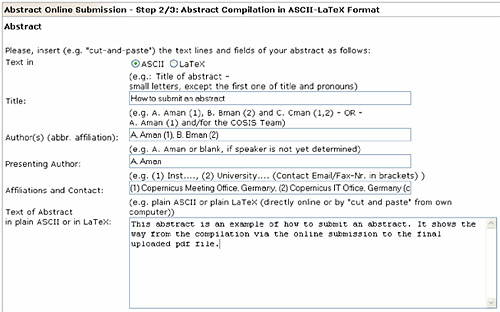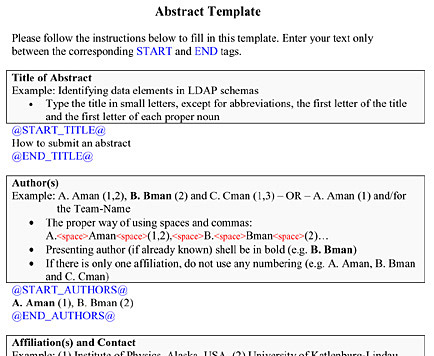How to submit an abstract
General
Summary of abstract submission
Detailed instructions
1. Compilation
2. Submission via COSIS
2.1. Author registration
2.2. Abstract registration
2.3. Abstract compilation
2.3.1. ASCII or LaTeX
2.3.2. RTF, WORD or WORD compatible format
2.4. Abstract submission
2.5. Acknowledgement
3. Abstract publication
Participants who wish to give a presentation (oral or poster) must submit an abstract in the way described in the following chapters. Abstracts should be short, clear, concise and written in English with correct spelling and good sentence structure. Mathematical symbols and equations must be typed in, and metric symbols should be used. Figures and tables should not be included!
We recommend that the abstract is carefully compiled and thoroughly checked, in particular with regard to the list of authors, before submission in order to avoid last minute changes. The length of an abstract is limited to one page. The submission of an abstract carries with it the obligation that it is actually presented at the meeting by the author or, at least, by one of the co-authors!
During the abstract registration (step 1/3) an author can choose whether a contribution should be a poster (choice "Poster") or is wanted to be an oral (choice "No preference", there is no guarantee that it will definitely become an oral). Please note that an author is able to submit not more than one abstract with the choice "No preference". Therefore, please decide carefully which of your contributions should get the status "No preference".
[ Go to Top ]
Summary of abstract submission
- Use a text editor of your choice to compile your abstract: (I) Title; (II) Author(s); (III) Affiliation(s) of author(s); and (IV) Text of abstract
- Use the link "Programme" > "Call-for-Papers" or "Abstract Management" > "Abstract Submission"
- Select the part of the programme you want to submit an abstract to
- Use the link "Abstract Submission" in the public links of this session in question
- Use the "Login" for COSIS members or the link "Quick Registration" for COSIS non-members
- Select your document type (ASCII/LaTeX or WORD compatible) and "copy and paste" your text into the appropriate fields of the form/template, submit and check the pdf file of your edited and formatted abstract
No emails – No faxes – No hard copies
[ Go to Top ]
To avoid any inconveniences by a potential loss of electronic data before or upon submission of their abstracts, authors are advised to use a text editor of their choice, and transfer the complete text lines or blocks by "copy and paste" from their locally stored electronic files into the text fields or templates, rather than typing it directly in the fields or templates, respectively. Thereby, the text lines and text blocks are reserved for:
(I) the Title: Type the title in small letters, except for abbreviations, the first letter of the title and the first letter of each proper noun,
(II) the Author(s) followed directly by abbreviation(s) of corresponding affiliation(s): the proper way of using spaces and commas: A.<space>Aman<space>(1,2),<space>B.<space>Bman<space>..., presenting author (if already known) shall be in bold. If there is only one affiliation, do not use any numbering (e.g. A. Aman, B. Bman and C. Cman),
(III) their Affiliation(s): the proper way of using spaces and commas: (1)<space>Institute of Physics,<space>Alaska,<space>USA,<space>(2) <space>University..., contact information (optional) must be placed at the end of the affiliation list in the following format: (email@address<space>/<space>Phone:<space>...), do not use a hyperlink in the email address (e.g. email@address is wrong, email@address is right), if there is only one affiliation, do not use any numbering (e.g. University of Katlenburg-Lindau, Germany) and, finally,
(IV) the actual Text of the abstract.
All text lines and text blocks can be compiled either in (1) ASCII or LaTeX or (2) in RTF, WORD or WORD compatible formats. Please notice the example below.

[ Go to Top ]
After the compilation the author uses the link "Programme" > "Call-for-Papers" or "Abstract Management" > "Abstract Submission" to get the list of all sessions/events. Study the list and the aims & scope of the sessions/events of interest carefully (public link "Information"), select the part of the programme you would like to submit an abstract to and then use the link "Abstract Submission" amongst the "Public Links" of your session/event in question. Please notice the example below where the session AS 1.01 was chosen.

[ Go to Top ]
Submission of an abstract requires the registration of the submitting author in the COSIS administration system (COSIS = Copernicus Online Service and Information System).
If you are already registered with COSIS, please insert your COSIS ID-Nr. & password and “Login”. However, if you are not yet registered with COSIS, please complete the "Quick Registration Form" first and then continue as indicated; you will receive your COSIS login data by email later on for future COSIS logins. The registration with COSIS is free of charge! If you are already registered but lost your ID-Nr. & password please use the link "Lost your login data?". Your registration starts the 3 steps of the online abstract submission.
Notice: COSIS members, i.e., registrants that have received their COSIS ID-Nr. & password, should under all circumstances submit their abstract via the option “COSIS login”, in order to avoid multiple entries in the COSIS administration system.
[ Go to Top ]
In step 1/3 please fill in the submittal information, type of presentation, contact author and publication. Make sure to choose the presenting author. In case a presentation has more than 10 authors, we advise the contact author to use the name of the presenting author plus an abbreviation of the team of co-authors, e.g. A. Aman and/ for the COSIS TEAM, and submit the name of the team and the list of the co-authors of that team separately.
Regarding "type of presentation" an author can choose whether a contribution should be a poster (choice "Poster") or is wanted to be an oral (choice "No preference", there is no guarantee that it will definitely become an oral). Please note that an author is able to submit not more than one abstract with the choice "No preference". Therefore, please decide carefully which of your contributions should get the status "No preference".

[ Go to Top ]
In step 2/3 the author chooses the document type.
[ Go to Top ]
Authors using plain ASCII or standard LaTeX should use the option “ASCII/LaTeX-Form” for compilation and submission. Please fill out the form with "copy and paste" from your text editor or type it in directly. If you use standard LaTeX commands please make sure to choose "LaTeX". Notice the example below.
Authors can then pre-view their abstract properly laid out and formatted automatically by the server before submission. The abstract is registered automatically in the COSIS meeting & administration system.

[ Go to Top ]
2.3.2. RTF, WORD or WORD compatible format
Authors using plain RTF or standard WORD or a WORD compatible software should use the option “WORD Compatible Template” for compilation and submission: they should download the RTF or the DOC template (also as ZIP archive), respectively, complete the template and store it as .rtf or as .doc on their computer, and then use the "Abstract Upload" tool for uploading the completed template. Notice the example for the DOC template below.
Authors can then pre-view their abstract properly laid out and formatted automatically by the server before submission. Authors not being satisfied with the transformation .doc à .pdf should select "Submit Abstract as Doc file" for a manual transformation by the conference office. The abstract is registered automatically in the COSIS meeting & administration system.

[ Go to Top ]
In step 3/3 the author can pre-view the automatically laid out and formatted abstract as mentioned above with the link "Preview of Abstract as PDF file". After this the abstract can be finally uploaded by "Submit" or can be changed by choosing "Change". Notice the finalised example abstract as pdf file below.
The laid out abstract have temporarily a lot of empty space in the header. After the final acceptance of the abstract by the convener, each abstract will get an official head and will become a citable publication in the EGU abstract journal Geophysical Research Abstracts.

[ Go to Top ]
Authors whose abstract has been received and successfully processed will receive an acknowledgement regarding the receipt and status of their contribution as well as its ID-Nr. for future updating/correction or withdrawal, respectively.
Abstracts will be included in the authors' personal record cards of the COSIS administration system.
[ Go to Top ]
Abstracts of contributions accepted for presentation by the session/event conveners/organizers and by the Programme Committee will be published:
(i) online in the chapter "Accepted Abstracts" of the respective session/event, and
(ii) either on CD-ROM
(iii) or in the programme book distributed to the meeting participants.